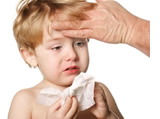
 Meningococcal
MeningococcalSigns, symptoms and prevention
The meningococcal bacteria responsible for the recent deaths of a James Cook University student and the hospitalisation of another has also been detected at Playmate Child Care Centre in Garbutt, Townsville.
The child has been admitted to hospital and Queensland Health has written to parents and treated children who were in contact with the infected child.
Meningococcal is a relatively rare but infectious disease and while a vaccine is available for the meningococcal C strain there is no effective vaccine for the B strain.
Babies and children up to the age of five are at increased risk of contracting meningococcal disease due to their less mature immune system, their tendency to put things in their mouth and their tendency to play close together and share food, drinks and toys.
In fact this group accounts for two thirds of the reported cases of meningococcal disease in Australia according to Meningococcal Australia Inc.
While this disease is rare, it is worthwhile ensuring that you and your staff can recognise the signs of meningococcal disease and know how to respond when necessary.
Symptoms
The symptoms of meningococcal disease may include one or any combination of the following: the sudden onset of fever, headache, neck stiffness, joint pain, a rash of red-purple spots or bruises, nauseas and vomiting and sensitivity to light.
Please note not everyone who contracts meningococcal disease develops a rash and if they do develop a rash it may not appear until late into the onset of the disease. The meningococcal rash does not disappear when gentle pressure is applied to the skin.
Young children and babies may have less specific symptoms including irritability, difficulty waking, high-pitched crying and loss of appetite.
Sometimes the symptoms described above may follow less specific symptoms including leg pain, cold hands and abnormal skin colour. Meningococcal disease may follow other respiratory infections.
People displaying symptoms of meningococcal disease should see a doctor urgently, especially for children and babies with a persistent fever, irritability, drowsiness, lethargy and loss of appetite.
How is it spread?
The good news is that meningococcal bacteria do not survive well outside the human body and are not easily spread between people.
The bacteria are passed on to people in the secretions from the back of the nose and throat, which requires close and prolonged contact with someone carrying the bacteria.
The bacteria are not easily spread by sharing drinks or food.
Who is at risk?
Anyone can catch meningococcal disease however those at higher risk include:
- People who share homes with patients of meningococcal disease
- Babies, young children, adolescents and young adults
- Smokers and people exposed to passive smoke
- People who practice intimate/deep mouth kissing with more than one partner
- People who recently had a viral upper respiratory tract infection
- People who travel to countries with high rates of the disease
- People without a spleen or other rare medical conditions.
Prevention
Keeping homes and cars smoke-free may reduce the risk of spreading the meningococcal bacteria however vaccination is the best way of preventing the disease.
There are two vaccines available:
- Meningococcal C conjugate vaccine protects against meningococcal group C disease and is recommended for all children at one year of age (as part of free routine immunisation) and for people who have had meningococcal disease.
- Meningococcal polysaccharide vaccine protects against groups A, C, Y and W135 and is recommended for travellers to countries where there are epidemics of meningococcal disease.
Further reading:
Meningococcal Australia
Australian Government Factsheet
NSW Health Factsheet
Victorian Government Factsheet
Meningococcal Education
© 2011 - All rights reserved
Care For Kids Internet Services Pty Ltd
ABN 55 104 145 735
PO Box 543 Balmain NSW 2041
privacy policy contact us